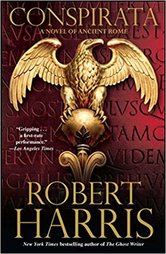Sacred Chickens
Menu
SACRED CHICKENS
 Conspirata combines political machinations with gripping drama. Set in ancient Rome, the novel centers around the legendary Marcus Cicero, at a time when he made his rise to power, and the republic began to fall apart. Aside from the fascinating political intrigue, the novel also holds some resemblances to our modern society, because, of course, Rome, and Greece before it, were Democracies. In hindsight, the reader knows the republic is doomed, but the characters don’t. Harris never lets the foreshadowing make its way into the characters actions; rather, he creates a real sense of the place and the actions surrounding the collapse. The heart of the novel focuses on the political struggle between two powerful figures in Rome: Julius Caesar and Cicero, two ambitious men with very different ideas of ambition. Cicero wants to rise within the system, and Caesar wants to destroy it and rebuild it to his liking. It’s also rich with classical oratory, reproducing eloquent and windy Senate debates, which are in some ways the best parts of the book. There are two parts to the novel. The first focuses on the ascension of Cicero to Consul, as he tries to hold together a Republic that is harshly divided. It is a society that is corroding from within and is attacked from the outside. Rome at this point is awhirl with controversy, hunger, and anxiety, and the discovery of an eviscerated child, evidently killed in a ritualistic manner, doesn’t help with the city’s fears. This is what Cicero is trying to hold together as Consul, all the while trying to stave off an assassination plot, historically called the Catiline Conspiracy. What follows are chapters of treachery and conspiracy. What struck me most was how the author displayed the political genius of Cicero, as he deals with every kind of political machination. The author also weaves the words of Cicero’s actual speeches into the novel, displaying the authors grasp of the politics at that time. In an interview, Harris said that the character of Cicero reminds him of the former President Barack Obama. The similarities between both of them: both brilliant speakers, both lawyers, and both trying to hold together a Republic that seems more divided that can be recalled in recent memory, are striking. Of course, it is impossible not to draw connections between our democracy and the Ancient Republic, and leaders like President Obama have been seen throughout history. This comparison is what makes the backdrop of the entire book- the subtle erosion of democratic ideals and the slow march towards authoritarian rule and the ultimate collapse of the Republic- rather troubling, which was probably the author's intention. However, while modern politicians may sympathize, Harris never overstates the similarities at the expense of the story. Caesar is an equally fascinating character. At first beguiling, he is revealed to be a ruthless politician. After a scandal involving his wife occurs, he divorces her the very next day to avoid damage to his reputation. His plotting reveals his thirst for power. He and Cicero share many qualities, but Cicero’s devotion to the Republic is his ultimate downfall. The second half of the book deals with the aftermath of Cicero’s Consulship. Instead of the valiant and crafty politician, his fame has corrupted him and gone to his head. In his attempt to overcome that hypocrisy, it is his ability as a politician that comes back to haunt him. His compromises and broken promises are quickly manipulated to mark him as a pariah. Through the course of the novel, Cicero bends many principles, sometimes for the good of Rome and sometimes for his own self-interest. Although it’s true that many of his problems are of his own over-reaching, they are also attributed to the fickle nature of the mob, who support him one year and condemn him the next. Sometimes the reader is torn between despising his feebleness and applauding his bravery. Throughout all of this, the novel is narrated by Cicero’s slave and secretary Tiro. He observes and tells the story in a detached way, and lays Cicero’s emotion more bare and frank than the orator would have perhaps done himself. In summary, the author portrays a governmental system that is imperfect, as it is undermined and exploited, a tale that’s all too relevant. The artful storytelling of Cicero as a flawed hero is fascinating, as are the political blood sports of the time. Combined with the elegant speeches in the Senate and the treachery and intrigue that pervaded the novel, Conspirata is a thrilling read. I would highly recommend the author’s work, and I look forward to reading his other books.  Jarad attends Middle Tennessee State University, loves tea, and tries to spend every spare second reading. Jarad is majoring in English. Bless his heart! Let's all light a candle for him and send him happy thoughts!
0 Comments
Leave a Reply. |

Click Photo above to buy ebook or paperback from Amazon.
Here's the link to Barnes and Noble Or order through your favorite independent bookstore! Categories
All
|
 RSS Feed
RSS Feed